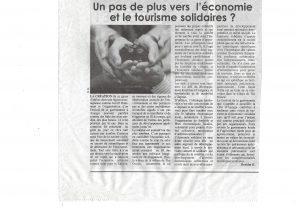A collaborative initiative has been put in place by the AMSED network in partnership with the Mountain Agriculture Association (APAM) in Aïn-El-Hammam, Algeria. This initiative has sought to recycle used clothing, while providing work for women of deprived communities. The idea is to provoke sustainable development; it is both providing jobs, as well as improving the environment by avoiding the waste of clothing that would take up space in landfills.
Ten women are part of the project, having been trained by professional dressmakers, are now able to turn used clothing into other things, such as traditional dolls for children and tourists, folders for documents, backpacks, and more. More than this, thanks to the director of the AMSED network, M. Djilali Kabèche, these women are allowed to sell their creations in markets and even in France through a catalog. With a strategy in place to sell their wares, this initiative will also allow the women to gain some financial autonomy.
The implementation of an initiative like this, as well as other things happening in the region, such as the food festival, may seem commonplace, or even trivial. However, they actually renew the good feelings within the civil society, and indicate progress towards good things. They signify an economy of solidarity for the Kabylie. Things have been too somber, which explains why the economy of solidarity has such importance, as a voice of hope. Additionally, the activities such as these signify a unification of the two different types of economies of solidarity: that which is brought by the traditional structures, and that which is brought by the modern structures such as associations.
The economy of solidarity will of course bring about local development, and with it, cultural tourism. This territorial tourism brings people to these specific regions, and increases the development that they experience. This then creates a need to revivify the importance of these things, such as the local gastronomy, the agriculture, the craftsmanship of the region, etc.

